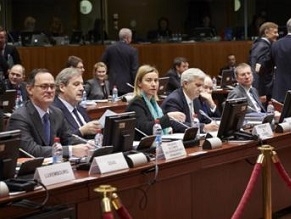|
World Jewish News

Although the labeling issue wasn’t on the formal agenda of a meeting of the EU Foreign Affairs Council Monday in Brussels, it was raised during the general debate.
|
The EU won't change its mind on labeling of Israeli settlement products
16.12.2015, Israel and the World Despite Jerusalem’s strong protest against what it calls a ‘’discriminatory and double standard’’ measure, the European Union won’t change its mind on the decision to put special labels on Israeli exports from the West Bank and the Golan Heights.
Although the labeling issue wasn’t on the formal agenda of a meeting of the 28 EU Foreign Ministers Monday in Brussels, it was raised during the general debate.
On November 11, the European Commission announced that it was issuing an ‘’Interpretative Notice on indication of origin of goods from the territories occupied by Israel since June 1967’’ which contains guidelines for EU members states to label products from Israeli settlements and exported to the EU market.
These products, the EU said in its notice, cannot bear anymore the label ‘Made in Israel’’ as the EU ‘’does not recognize Israel’s sovereignty over the territories occupied by Israel since June 1967, namely the Golan Heights, the Gaza Strip and the West Bank, including East Jerusalem, and does not consider them to be part of Israel’s territory.’’
Following the EU announcement, which provoked the ire of Israel, Jerusalem told EU’s ambassador Lars Faaborg-Andersen that it was suspending its diplomatic dialogue for a number of weeks.
Foreign Ministry officials later clarified this decision pertained mostly to Palestinian and human rights related issues, but that the dialogue would continue on other topics.
But Israeli Prime Minister and acting Foreign Minister Benjamin Netanyahu went even further when he instructed two weeks ago the foreign ministry to suspend contacts with the EU on issues related to the Middle East peace process ‘’until completion of a reassessment of the involvovement of EU bodies in everything that is connected to the diplomatic process with the Palestinians.’’
Speaking to reporters after Monday's Foreign Affairs Council, EU foreign policy chief Federica Mogherini said: ‘’Let me add two short points that were not part of the discussion or of the agenda but were still debated among us. One is related to the Middle East Peace Process, especially after the adoption of the technical guidelines on indication of origin. We had an exchange of views in this respect with the ministers and we commonly decided that it was important also for me to pass this message publicly that the Council and the European Union stay united on these technical guidelines on indication of origin which is in no way a boycott and should in no way be interpreted as one.’’
She stressed that the EU Council of Foreign Ministers was ‘’completely united in our continued engagement in the Middle East Peace Process and in broader bilateral relations with Israel. There is full unity and solidarity among Member States and among European institutions on that.’’
Some EU countries, including Hungary and Greece, have recently stated their opposition to the labeling of Israeli settlement products.
Israel considers the EU’s labeling decision ‘’politically motivated’’ as it discriminates against the products of one country, Israel, while there are some 200 territorial disputes around the world, such as in Western Sahara and northern Cyprus, for which the EU didn’t issue labels.
Many in Israel fear that the labeling is only the first step leading to a total boycott of Israel, particular given the active role of Boycott Divestment Sanctions (BDS) in getting the labeling passed.
by Yossi Lempkowicz
EJP
|
|
